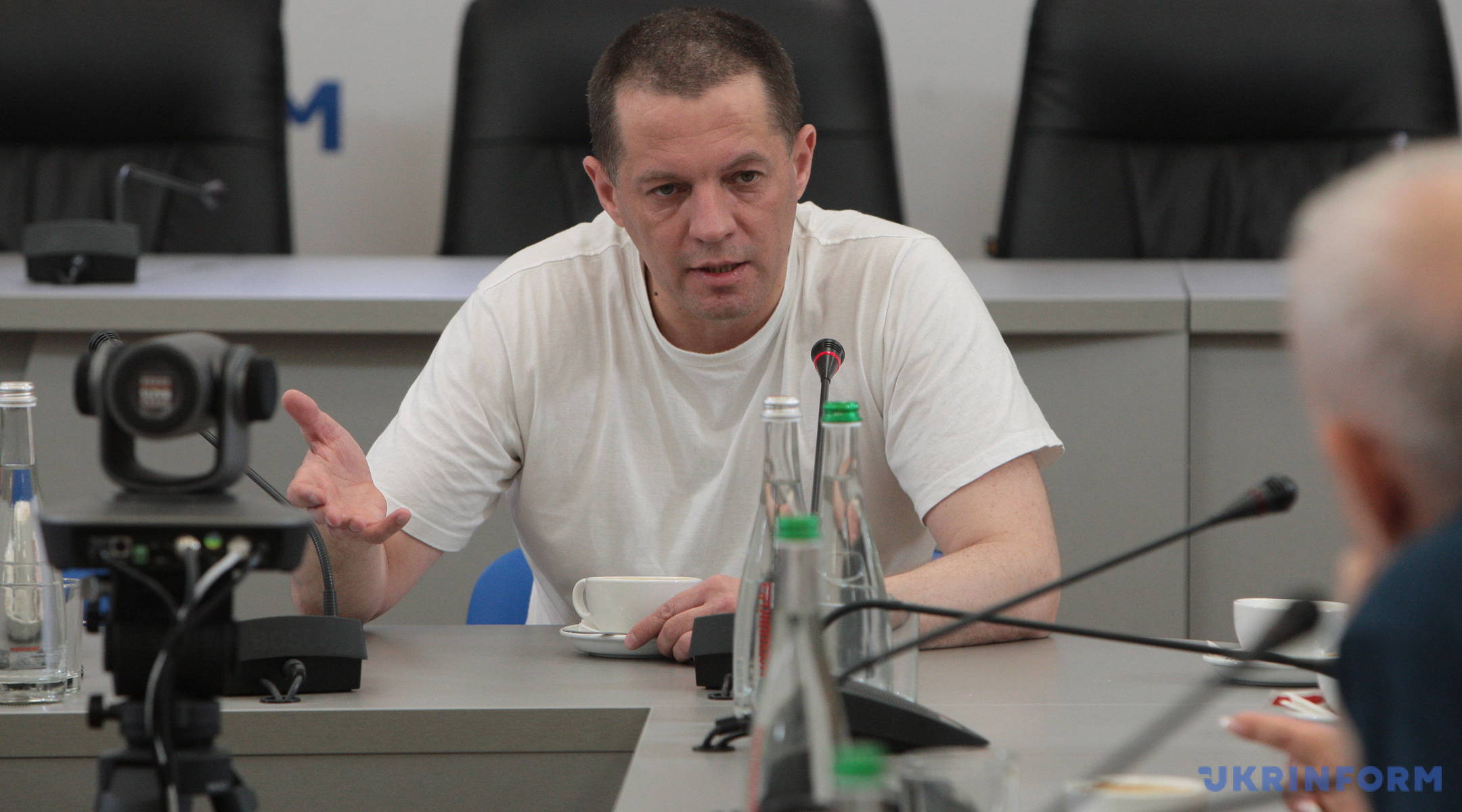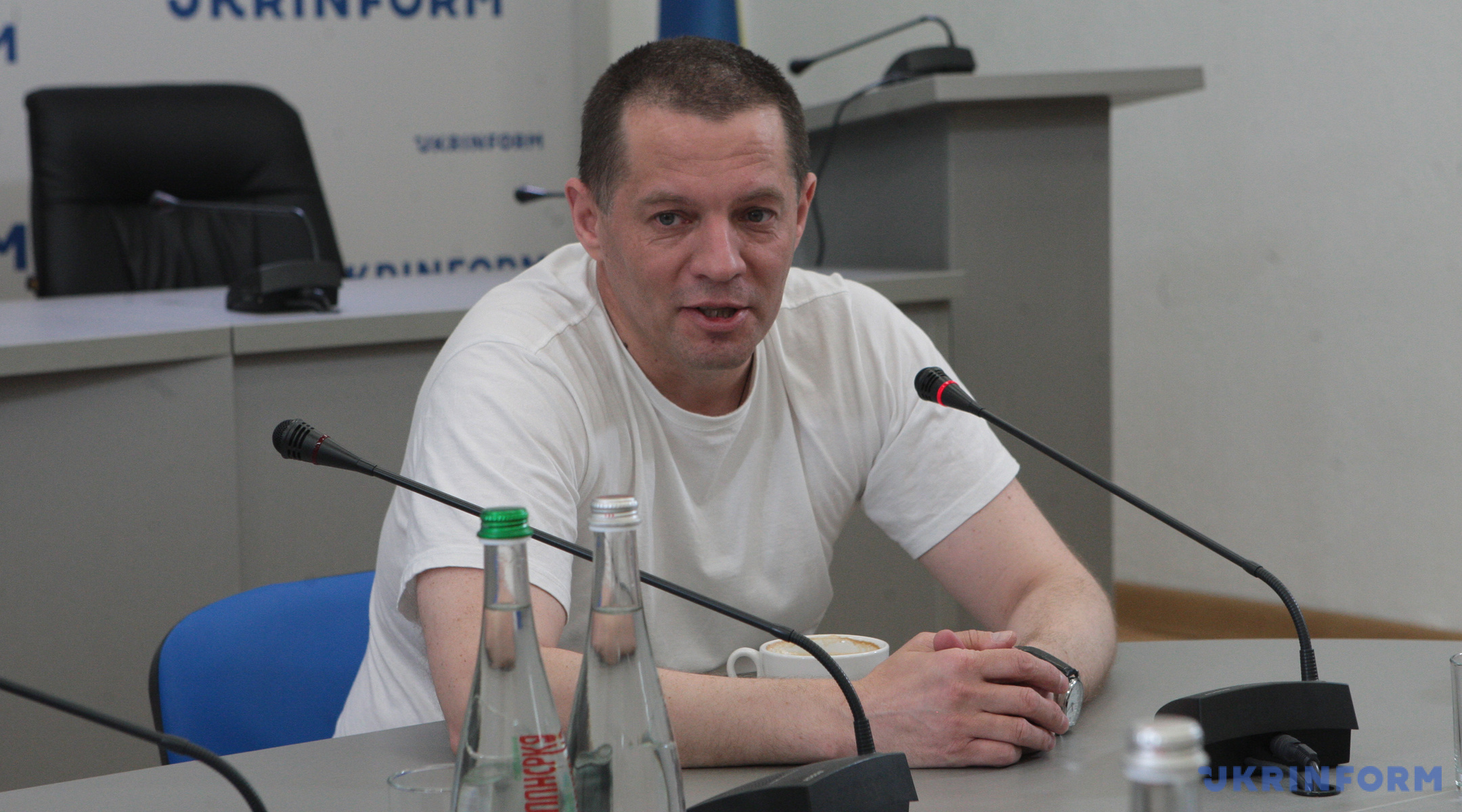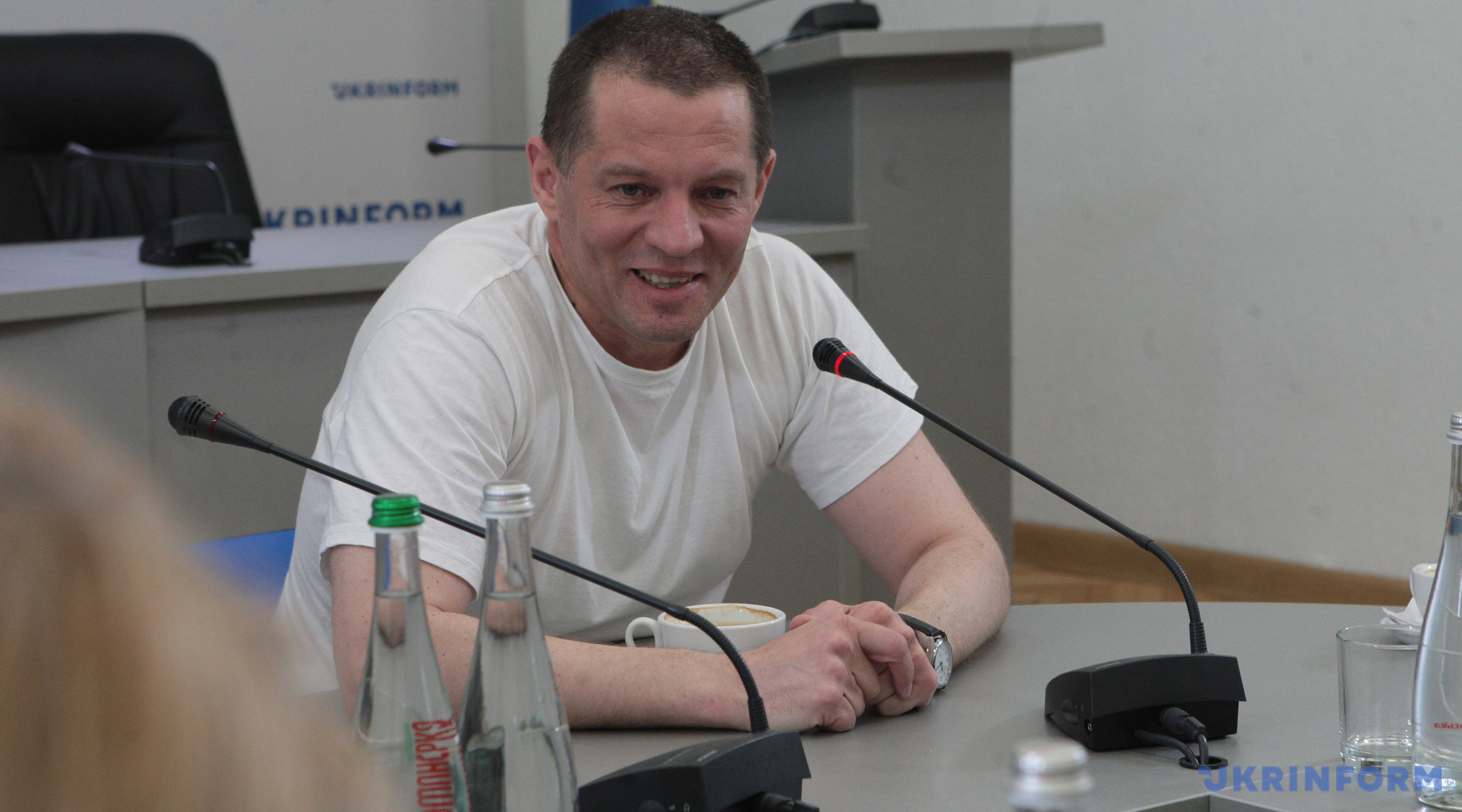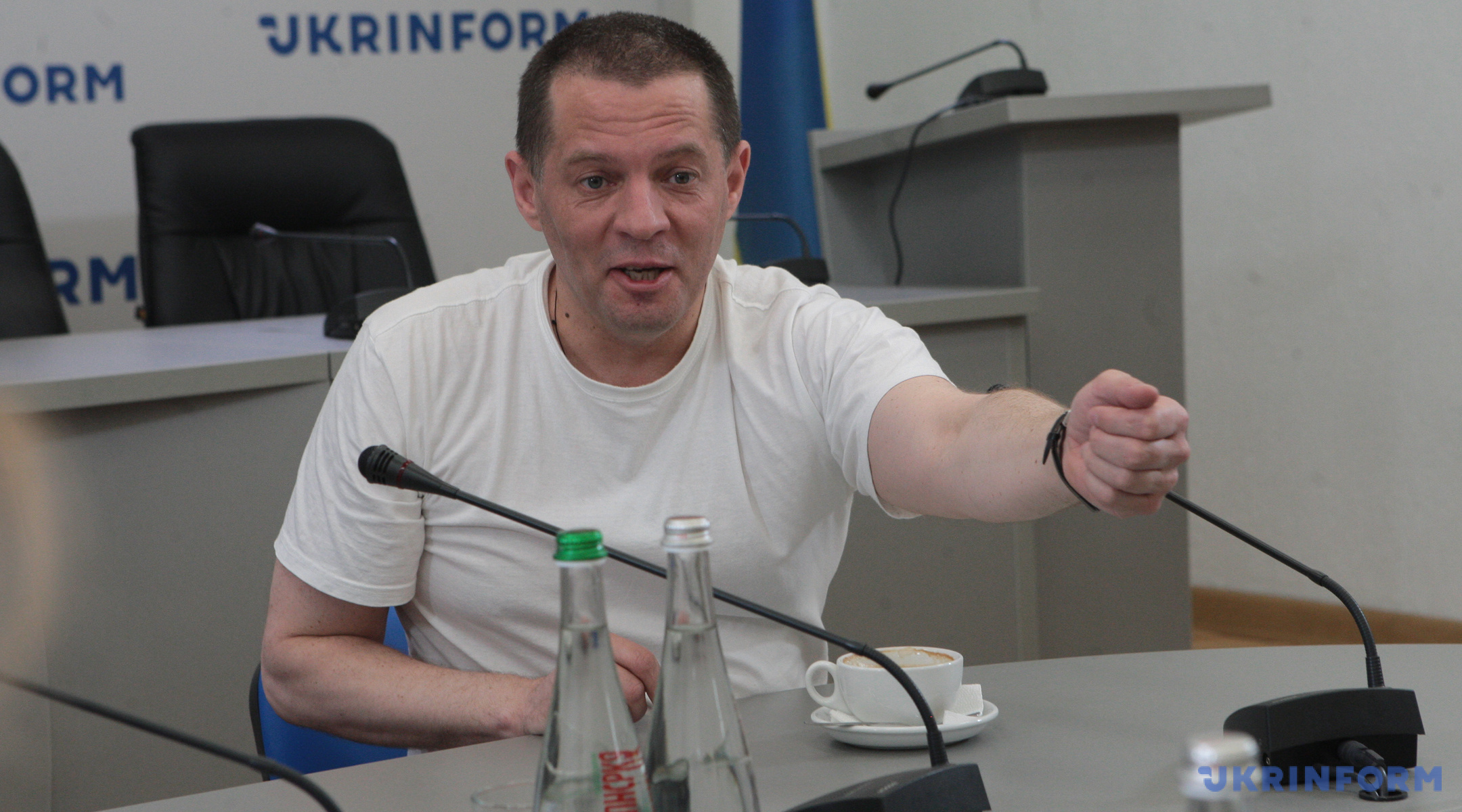Roman Suschenko visited Ukrinform two days after his release. It was a short visit as he had to come to hospital for a medical examination.
Joy, smiles, warm hugs. We did not see Roman for almost three years.
Ukrinform Director General Oleksandr Kharchenko opened a bottle of sparkling wine "Krym" that was hidden on Journalist Day in 2017, especially for a future meeting with Sushchenko. It was his first Journalist Day in imprisonment that lasted for 1,070 days.
Just imagine the number of questions that Ukrinform colleagues wanted to ask Roman. So the first interview was held together.
Question: Roman, that might not be the best question to begin the interview with. But after so many years in Russian prisons, who are the Russians today, what was their attitude to you, what is the system that you had to encounter?
Answer: If we talk about people I talked to and saw their actions, they are different because they represent different peoples and nationalities, with their mentality, their cultural traditions. However, all of them identify themselves as citizens of Russia. If we talk about Russians as a nationality, their mentality was formed according to the place of residence. At the very beginning of this hell and in Lefortovo, I encountered one kind of people, and later - in the penal colony and on the way there - I encountered another kind of people, different language, other accents.
There were different people, and the attitude to them is different. The Russians with whom I corresponded and who supported me are another thing. I am grateful for their civic position and human support. But the letters were also different and much was read between the lines. Someone sincerely supported me, shared knowledge, news, and someone "from the system" had specific tasks. At times, questions in the letters were frankly abusive.
In general, I do not feel great resentment or hatred towards all Russians, but it is unpleasant to mention them.
The attitude to those in uniforms is definitely negative. However, despite brutal things I had to face, they did not use physical influence or abuse. There was no physical torture in my case. I heard from prisoners during the prison transfer and then in the colony, and I also read in the press about horrible things, about how the administration treats them.
By the way, there were some prison officers who took my position with understanding, sometimes with respect and sympathy ... But there were just a few of them.
There were many people who behaved "neutrally," as written in the charter. They said "good afternoon," "good evening," they behaved humanely.
In the colony, however, it was quite different - rudeness and psychological pressure lasted for about a month or one-and-a-half months until the consul arrived. The difference between a detention facility and a colony is noticeable. There is a caste in the colony, there are mob rules - a specific code of conduct. There are ordinary random people out there, but there are real killers, drug addicts, thieves, robbers. Most of them say they are not guilty, that it just happened so, etc. And the attitude I had towards them was like in a train when you get into a railcar, meet someone traveling in the same direction, chat with them, and you then leave the train and forget them. So I charged myself psychologically because otherwise, it was impossible to survive.

Q: Were there any provocations?
A: Yes, there were also treacherous things. In the colony, there were several attempts of provocation, attempts to wrong-foot me. For example, I was kept in a punitive isolation cell, although according to their standards, I was to be kept in a safe place on general grounds. That is, it should have been normal mode. But the prison administration (I do not know what they were guided by) placed me in an isolation cell for people who committed the gravest crimes and those who position themselves as thieves and recognize neither laws nor rules nor power. Detention conditions there are very harsh, restrictions are terrible.
I was placed with a neighbor who had agreed with one of the prisoners working for the prison administration to get a wire for a homemade water heater. The neighbor was walking in another area and the prisoner I mentioned asked me to pass the wire. I agreed and hid the wire in my clothes. After a walk, an inspector met us with a metal detector. So it was a concrete stitch-up! I then understood why it was done – in order to lower my status, because I did not live under general conditions, without any limitations, and I was preparing for a future meeting with my family. I was second in the line, and the search began with the one walking ahead of me. This gave me time to get rid of the wire. But it was visible in the eyes of those who did the search that they were ready to find something and they searched me three times...
It was a shock for me as a journalist. They put a stinking bag on my head and handcuffed me so that I could not move. They asked me if I had a poison capsule or any weapons.
Q: Roman, you are in a psychologically difficult situation. Do you think that they have stolen three years of your life, or those three years were not in vain, and you discovered something for yourself, some traits that no one expected before?
A: Frankly speaking, I did not expect myself to be able to keep it that way. For a person from the humanitarian sphere, especially for a journalist, it was a shock, when there were a seizure and further action, and a stinking bag on my head... When they handcuffed me so that I could not move when one was holding my throat and the other searched me. They asked me: "Where is a poison capsule? Do you have any weapons?" I was shocked: what poison, what weapons? I asked them on their bus if it was intimidation or humiliation, and I did not get an answer.
Then all my life flashed before my eyes. I also knew that the war was going on, people were dying. I knew how they treat everyone who was captured. Accordingly, I was preparing for "cellars," torture, and then "confession" in front of the camera, electrical wires and other horrors... I began to realize what expected me, and, of course, I was afraid as every normal person. But this shock lasted about two or three hours. When we came to the investigative department, the bag was removed from my head and the chief took a napkin – they tore off a mole on my face with that bag - and soaked the blood. Then I sighed with relief and realized that there would be no physical torture, and they were probably preparing me for some other mission. I came to my senses. The conversations began, and I understood what they expected of me. First came the investigator, a major with a completely shaved head. He appeared to be a more or less educated person, politely passing all procedural moments. And then, ten minutes later, a lieutenant colonel comes in, with gray-eyed, bald, blond, his a colorless face, as they write in the books and film in the movies. You would not remember one. "Good evening," he says. "We have been waiting for you here. My name is Mikhail Vladimirovich Svinolup. I am the deputy chief of the investigation department. We offer you cooperation with us. Will you cooperate or not?" Then a lawyer appointed by them came and said: "You face 20 years of imprisonment under the article you are charged." I was so stressed by these words. Later, the investigator again asks: "So, will you cooperate with us or not?" I say: "I heard you, goodbye." Then we went to a detention center of the Interior Ministry. I closed my eyes at three o'clock in the morning, and at six o'clock I heard the State Anthem of the Soviet Union at full volume and realized that here was the bottom. In the morning, we arrived at the Lefortovo court and all this nightmare continued. The judge asks me questions, and I don't understand what's going on. She said to me: "Do you agree or not?" I said to her: "Yes, no" ... The reaction was unconscious.
Then they brought me to the Lefortovo prison, completely changed my clothes and took all my things. They dressed me in work clothes. And in quarantine, some awareness of the situation came to me on the second night. Two days later, lawyer Mark Feygin arrived to see me and we made a deal. And I realized that this was the beginning of the struggle.

Q: These years have still been stolen from your life. Did you get some experience?
A: Yes, of course, they have been stolen. On the other hand, it was invaluable experience that you cannot wish anyone. I'm not sure if this will ever help me. But it was a test, and it seems that I was able to go through it as I had planned. I started planning in this isolation cell. Then I subconsciously switched to all these drawings, books, readings. I started to do a little physical work. There was complete isolation there. I was left alone with my thoughts: "I am 47… Oh, how old will Maksym [Sushchenko's son who was nine years old at the time of his father's detention] be when I return. I will not see him grow." In this context, of course, time has been lost, all these three years.
Q: Roman, I want to ask a question to which we had no answer for three years. Why did you go to Moscow? Who did you meet when the detention took place?
A: I went to Moscow for family reasons. There was an urgent need to help my relatives. After solving some of the problems, I met with an old acquaintance. He is a military man who served in internal troops, and I have known him for many years. We met at his request.
Q: Is he the one whom Mark [Feygin] called your godfather?
A: Yes, he is.
Q: So you baptized his baby?
A: Yes, I did. In general, this story is like a biblical one - about betrayal, with Cain and Abel. But I had no idea about that. In fact, as it turned out later, it was a sophisticated, insidious and cold-blooded provocation led by the Russian special services. During the meeting, he planted on me a disk under the guise of family photos, which in the course of the investigation "turned" into some secret information about the training of internal troops and the armed forces of the Russian Federation.
During the investigation, my acquaintance asks special forces officers in one of the recordings" "Well, was the game worth the candle or not?" And the answer is: "Everything is great!" Then I realized that it was planned and it had been planned for a long time. I don't know why he did it and what his motivation was, but I suspect he may have been "on the hook".
Q: Could your anti-Russian articles be the reason for your detention?
A: I do not rule out that.

Q: The FSB also reported that you were collecting information about the Russian Armed Forces.
A: This is a theory of the investigation. They even demonstrated as evidence some of the news stories for Ukrinform about France that are publicly available on our website. These are official statements by Francois Hollande, the French Foreign Ministry, French experts, etc.
Q: So this operation was planned not within a few days of your stay in Moscow, but long before the trip. Yes or no? And the second thing. Obviously, you will have to answer this question many times. Did you have any awareness that Russia is a country we are at war with, and was it worthwhile to go there despite all the problems?
A: Regarding the first part of the question, yes, it was clear that this operation was planned and implemented for at least a year or even more. As to whether it was necessary to go there, it was a wrong, frivolous decision. But cannot do anything here, it is impossible to turn back time. What has happened is, of course, a great grief for my family and a waste of time. But we must look ahead!
I strongly advise anyone who has connections there [in Russia] to weigh up all the pros and cons and wait until the situation changes, common sense prevails, and the authorities, this regime change . But it's not worth running risks.
Q: Then again about the future. Obviously, you have changed after these years. Given this very specific experience, are you going to use it somehow? Perhaps it will be some kind of involvement in human rights activities regarding the remaining prisoners? Perhaps articles about prisoners? Or maybe public or political activity?
A: I understand your appetite in this regard. However, I have not decided yet. The main thing now is to resolve all questions with a medical examination, undergo some treatment, change the light bulbs at home, hammers nails in somewhere, some household things… And then time will tell. Of course, I plan to return to the agency [Ukrinform]. There are plans to share this experience in manuscript and video formats. There are also plans to share even some of the museum exhibits, to add some interesting pictures to the heritage of the Kyiv museums. I will gladly share this information.
And there are almost a hundred more people imprisoned there. They need to be released. Therefore, I am open and ready to share my experience. I have a vision. It is narrow because I was a prisoner. How to act at higher levels is not my competence. But if any questions arise, I will be happy to answer them.
When it comes to community activity, there are such intentions. I have an idea to create a fund to support the families of political prisoners. Some support systems are already in place. When we traveled with the rest of our prisoners on the bus, all of them said that they stayed in different colonies, the specifics were different, but everyone said they received support. Someone was passing on food, someone was writing letters, someone was just coming and reporting that they had not forgotten you, worried about you. But there are also other people who do not get so much attention, and everyone has his own case. So, I think we need to strengthen that focus. Alternatively, I mentioned earlier in an interview with our native agency, for example, to auction my works and transfer the collected funds to the account of an organization that will take care of prisoners and political prisoners. I have some ideas, and I very much hope that we will also try to implement this project with your help.
As for the political future, I didn't think about it because it's a very complicated thing.
Q: When you spoke about your detention, you said that you understood that it was the beginning of hell. How do you feel after returning from hell? How did you spend these few days at large? Have you seen your mother?
A: In fact, I have not fully realized what happened. By inertia, I wake up at 5 am, as in an isolation cell, as in Utrobino. I got my phone today, took it from my relatives, and tried to recollect how to text messages, because I did not hold any gadget for three years, except for a handset.
Frankly, I tried to smile, to hug. But I feel that it is not so sincere, that there is some kind of fatigue as if I burned out. You look at people you know, you remember names, but you feel some sadness, some emptiness, and it has not been filled yet.
Of course, there are plans to talk with my son, with my daughter, with my family. I called my mother as soon as I arrived, but the reaction was different, the reaction was terrible! I know that there were already some reports a week ago [on the return of political prisoners of the Kremlin to Ukraine]. They said: "They are already flying!" And the elderly person was already waiting for that but all of this suddenly ended… And then again, again. There is such stress ... I tell her: "Mom, I'm back, you get used to this thought quietly, I'll call you in a few hours...". It's good that the older grandson was next to her. I called my mother again in a few hours, and she calmed down a bit and we talked more or less.
Q: Roman, no doubt that you counted every day spent behind bars. Please tell us which one was the most difficult?
A: Yes, 1,070 days. There were several most difficult days. Of course, this was the first day when everything was so sudden and this stress was so crazy. When I realized that everything was over. I was afraid, and the biggest fear was that I would not stand it when they start using physical influence.
Then, in quarantine, it was a little easier. They even gave me a book. And then, on the eve of the weekend, members of a public monitoring commission came to visit me - Zoya Svetova. Elena Maysyuk from Novaya Gazeta came the next day . I met and got acquainted with Mark Feygin and realized that I was not left alone with the devil.
The second difficult day was when a suicide occurred in Lefortovo. One prisoner charged under the drugs article was sitting in an isolation cell just in front of my cell. In the evening, when prison officers collected the garbage, we heard someone screaming – a man hanged himself. What struck me most was not the fact of death, but the fact that his body was taken out on a food trolley.
The third case was the transfer to the colony in a Stolypin car, when we were stuffed in one wagon like herrings for 28 hours.
I stayed in isolation for two years, limited in communication – a lawyer, a consul and a neighbor. And here I get into a Stolypin car. I am taken out of Matrosskaya Tishina, and 13 hardened men are brought from another detention center – Medvedkov - some of them participating in the prison transfer not for the first time. When I saw this mass of people, I realized that the company is not fun. In anticipation of some movements, I actually did not sleep for 28 hours on our way from Moscow.
When we were escorted from the train station, all prisoners were taken from the wagon with their things and connected with chains. There were custodians and dogs around us. Everyone had two or three bags. There was a crust of ice, everything was frozen, it was possible to fall. We were lined up and then packed in a police van.
There were three such cases. Later, when you get used to it, you look and know what to expect from others in the colony, it was a little easier.

Q: What helped you withstand this ordeal, what gave you strength?
A: When I realized that some of my worst expectations had not proved true, I began to treat the situation with irony. This attitude to everything that was happening saved me. Drawing - as a psychological relaxation and psychological unloading - also saved me.
Moreover, psychological testing was carried out in the colony. They have some methods, some Lusher tests, more than a thousand questions to detect aggression, the inclination to commit suicide. I wrote the answers and put the crosses. There were such questions: "Can you kill a chicken?" And then, after 20 questions: "Can you kill a lamb?" When I received a conclusion after four months, I thought: "What am I doing here? I have to be enlisted in the squad of astronauts, at least." That is, they did not find any psychological deviations, and I think that the attitude to some difficult situations with humor saved me.
Q: You talked about drawings. The whole world in this sad period saw your incredible drawings and opened you as an artist. Was it just like therapy? Will we be able to see Roman Sushchenko as an artist and will you continue to create?
A: Maybe I would have revealed my talent earlier, but journalistic activity actually gave me no time for drawing. In addition, I am quite critical of my works. I do not claim any heights in the field of painting. Regarding plans, it depends on time and inspiration.
I collected energy and inspiration even from correspondence. Someone will write something interesting, you will answer, and it is such a psychological exaltation that for some reason you want to draw! In addition, I subscribed to some Russian newspapers there. Deliberately. Some of them were propaganda ones, while others were more or less balanced, with photographs, drawings and advertising. Since the real world was limited to four walls, and you cannot pull everything out of your imagination, I used all of that, and it all came out on paper in ink and with the help of natural dyes available.
Q: You used onion skin and ketchup as a paint. What exactly did you use to create these pictures?
A: There were experiments. First, I used black and blue ballpoint pens and a pencil. The eraser was forbidden so I had to cut out a piece of rubber from my slippers and erase unnecessary things quite successfully. The paper was regular so I could not display something extraordinary. I did what I could. The first drawings were two-colored. Then I recalled that when you drink tea, you can get one color. Secondly, I remembered my grandmother's Easter eggs how they were painted with onion skins, so I decided to use it. There were pills that gave a yellow color - furacillin, I think. Accordingly, several colors were already available: blue, black, yellow in several tones, and white at the expense of paper. Later, I experimented with carrots, but the color was unstable, and it faded quickly. I tried with beet juice, and this color was saturated. That was until I got into the colony where the consul brought me pastel, and then my lawyer Mark brought me watercolors. And it was already a find! On the other hand, it was a little different style. That is, it was all in the form of an experiment, and I went to it intuitively, although I do not know the recipes of ancient paints.
The result is very good. We thank you, and we wish you only good inspiration for future pictures!
Ukrinform
Photos: Yulia Ovsiannikova, Ukrinform
